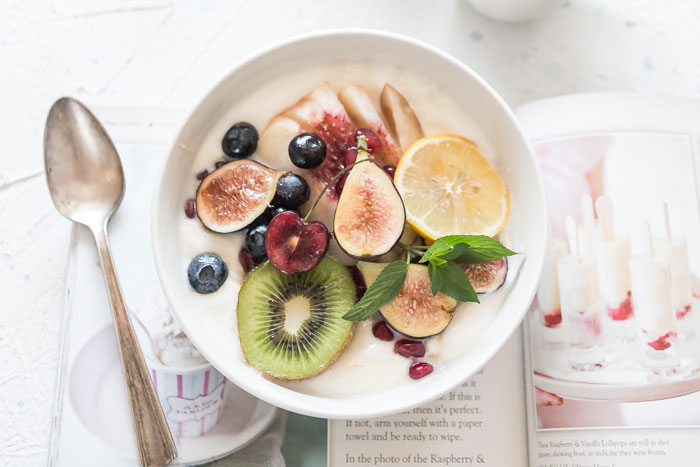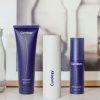 Feature Image by Brooke Lark
Feature Image by Brooke Lark
From high fiber and gluten-free to all natural and fruit-flavors, many foods at your local grocery are labeled with these types of “health benefits.” But, in reality, it might not be as healthy as you think.
To help you decipher the real from the fake in the fight to improve your health and wellness, we asked dietitians and nutritionists to share 20 seemingly healthy foods that are actually bad for you.
Granola bars
“People think [granola bars] are a ‘health food,’ when in reality, it’s full of added sugars and hydrogenated oils that can wreak havoc on your blood sugar levels and gut health,” says Christine Sellers, nutritional therapy practitioner at Soul Strength Training LLC. “Check the ingredients, or skip it altogether. A good substitute: some fruit with nut butter,” Sellers adds.
Yogurt
“Many health nuts think a bowl of yogurt with granola is the perfect breakfast, but breaking down the nutrition shows the combo is quite the opposite,” according to Rebecca Cafiero, integrative nutritionist. “Yogurt is typically high in sugar and low in protein [and] the claims of probiotic benefits are exaggerated as probiotics are only beneficial in ‘live form’ and probiotics in most yogurt are killed during the heating process.”
Acai bowls
“Acai bowls usually come packed with sugar — despite being made with acai fruit, the fruit is blended into a liquid, which takes the natural fiber out of the equation, leaving just sugar,” says Rachel Fine, registered dietitian and owner of To the Point Nutrition.
Gluten-free products
“Unless you have a gluten allergy, choosing gluten-free options aren’t always a healthier alternative. Often, these are highly-processed food products made with low-fiber grains such as rice,” says Maya Bach, registered dietitian nutritionist. “These products may also be lower in other beneficial nutrients such as B vitamins and iron. If you’re looking for an alternative to wheat, choose an option made with more nutrient-dense ingredients such as chickpea or oat flour.”
Roasted nuts
“While raw nuts can be a healthy source of fats and protein, where we go wrong is buying roasted nuts,” according to Briana Michel, holistic nutrition coach. “When the oils are roasted, it becomes inflammatory because the heat damages the polyunsaturated fats and it becomes vulnerable to oxidation and going rancid.”
Store-bought smoothies
“We often think of these as being healthy choices loaded with fresh fruit, but be sure to evaluate what you’re actually getting,” says Elizabeth Huggins, registered dietitian nutritionist at Hilton Head Health. “Often, the first ingredient is sugar, cane sugar, or a sugary fruit concentrate, with little fruit or fiber to be found. Ideally, making your own smoothie composed mostly of fresh or frozen fruit is the way to go.”
Frozen meals
“While there are tons of frozen dinners boasting on its label about how healthy it is, many have additional preservatives and [skimp on] protein and vegetable servings. These light meals are so low calorie, they won’t sustain you and may have you scrounging for unhealthy eats later in the day. Rather than relying on frozen meals, cook a double portion of healthy dinner recipes so that you’re covered for more than one meal,” says Brandice Lardner, nutritional therapy consultant at Grace Filled Plate.
Diet soda
“Diet sodas disrupt your gut flora,” according to Dr. Lauren Deville of Nature Cure Family Health. “Second, the artificial sweeteners are associated with all kinds of illnesses, from cancer to neurological diseases.”
Cereal
“People think foods like cereals are healthy, when in reality, these are packed with sugar and things that turn to sugar. You’d be much better off eating whole foods, or if you must eat something ready-made, look for the fewest amount of ingredients,” says Allison Herschede, registered nurse and certified diabetes educator.
Deli meats
“Many folks turn to deli meats as a protein in a sandwich, a snack wrapped in lettuce, or with a side of veggies. While it sounds like a great pairing, the challenge is that deli meats tend to be loaded with added salts, saturated fats, preservatives, and fillers, says Maya Feller, registered dietitian nutritionist. “I tell my patients they are better off grilling a piece of meat and slicing it themselves.”
Meal replacement or protein bars
“These bars are often loaded with sugar. If you read through the ingredient list and you cannot pronounce the ingredients, then put it down,” advises Dr. Keith Kantor, nutritionist and CEO of Nutritional Addiction Mitigation Eating and Drinking. “There are some packaged bars that are made from dried fruits, nuts, and spices, but most of these bars are glorified candy bars.”
Dried fruit
“Fruit is always healthy, right? Not so fast when it comes to dried fruit,” says Dr. Candice Seti, certified nutrition coach. “Often times, dried fruit has added sugar. Even if dried fruits don’t have added sugars, it’s still a concentrated of source sugar. Go for fresh fruit that hydrates and fills as you eat it to keep portions naturally under control.”
Fruit juices
“Some fruit juices contain extra added sugar. Others contain little real fruit juice at all. Thus, these partial fruit juices contain few, if any, of the vitamins and minerals present in the fruits it represents,” according to Brian Bender, certified nutritionist and co-founder of Intake.
Agave
“Ah, the naturally sweet, supposedly healthy agave. Here are the facts: Ounce for ounce, agave is much worse than sugar. Sugar contains substantial amounts of fructose, which, when consumed in excess, causes extensive metabolic problems. Sugar is roughly 50 percent fructose and 55 percent high fructose corn syrup. Agave is composed of even more, up to 70 to 80 percent. Natural isn’t always healthiest,” explains Dr. Luiza Petre, weight loss and management specialist and clinical cardiologist.
Pumpkin-flavored foods
“Many of the pumpkin spice-flavored products that come out at this time of year have little to no actual pumpkin in it,” says Summer Yule, registered dietitian or Summer Yule Nutrition. “People may think that they’re getting a product with the nutritional benefits of pumpkin, such as fiber and vitamin A, but all they may really be getting is a cinnamon-flavored dose of added sugars.”
Veggie chips
“Making veggie chips at home is a great way to add more plant food to your diet. However, many of the veggie snacks found in the chip aisle are more like its potato chip cousins than the produce pictured on the bag,” says Kristen Koskinen, registered dietitian and nutritionist at Eat Well Pros. “If the chip you’re eating doesn’t list the vegetable you think you’re eating as the first ingredient, then it’s not necessarily any better for you than a regular potato chip.”
Kombucha
“It has a ton sugar. Probiotics are great, but there are many other ways to get it than sugary tea,” explains Erin Wathen, holistic weight health, loss, and life coach at Wellness Solutions LLC.
Artificial sweetener
“If you want to lose weight and gain health, then you should stay away from sweeteners like stevia, xylitol, and erythritol,” says Angela Bicos Mavridis, holistic nutritionist and founder of TRIBALÍ Foods. “Even though it doesn’t have calories or raise your blood sugar, it irritates your gut lining, which is counterproductive to greater health and can often sabotage your weight loss goals.”
Salad dressing
“Commercially bought salad dressings are chock-full of unhealthy oils, preservatives, and sugars, which quickly turn your greens into a far from healthy meal. Instead, opt for a simple dressing made from extra virgin olive oil, vinegar, and dijon mustard,” says Evie Fatz, certified strength and conditioning coach and certified nutrition coach.
Sushi
“These healthy bite-size rolls are great for making you feel like you’re not really eating anything,” argues Caleb Backe, personal trainer and health and wellness expert at Maple Holistics. “The truth is, the amount of sugar going into these tiny Japanese favorites leaves much to be desired. If you’re dying for a sushi fix, then opt for sashimi and stay away from spice or crunch as it really ups your calorie intake.”
xx, The FabFitFun Team




